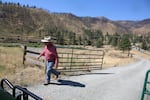From county commissioners and state lawmakers to a member of the U.S. Congress, some Oregonians in power have enabled the extreme beliefs and conspiracy theories fueling political violence carried out in the name of President Donald Trump.
The upheaval continued in Oregon last weekend, when a man was arrested in Portland on suspicion of firing shots at a federal courthouse. Weeks earlier, Cody Levi Melby had been in police custody and released in Salem, where officers said they found him carrying a gun and trying to break into the state Capitol building. Like many Trump loyalists, Melby echoed baseless claims about the “theft of votes,” making it clear he did not accept the results of the 2020 presidential election, according to court documents.
Related: How Cliven Bundy found a following
Meanwhile, local, state and federal leaders in Oregon politics have emboldened false narratives about the election, undermining the legitimacy of President-elect Joe Biden. Some experts say these tactics have become mainstream in recent years, as elected officials condoned extremist actions and rhetoric in the Northwest, giving political legitimacy to people who ultimately have sought to stop the democratic process.
Before Malheur
Following the attack on the U.S. Capitol on Jan. 6, commentators and journalists pointed to the armed takeover of the Malheur National Wildlife Refuge as a clear point when the current climate of extremist violence started. The two events had many similarities: in both cases, crowds of mostly white men, some dressed in tactical gear and carrying weapons, took over a federal building by force. Law enforcement at both events also were initially reluctant to intervene.
But the direct origins of the insurrection in Washington, D.C., have even deeper Western connections and date back even further.
In 2015, armed militias flocked to Southern Oregon to defend the operators of the Sugar Pine Mine in a dispute with the Bureau of Land Management. While the particulars of that case revolved around bureaucratic issues involving surface mining rights, anti-government activists like Joseph Rice were quick to decry BLM action as tyranny.

During the occupation of the Malheur Wildlife Refuge, many occupiers carried pocket U.S. Constitutions
Amanda Peacher / OPB
Rice was a leader of the Josephine County Oath Keepers militia, and the Sugar Pine dispute came roughly a year after Nevada rancher Cliven Bundy successfully called armed extremists to his side to stop the BLM from impounding his cattle on public lands after he failed to pay grazing fees for decades.
The anti-government movement saw what happened at Bundy Ranch as a victory after federal officers relinquished the cattle. Rice’s local Oath Keepers and other militia groups hoped to do the same in 2015. They didn’t face intervention by law enforcement or pushback from local elected leaders. The local sheriff helped mediate the dispute and the militias eventually left, according to High Country News, though some would return months later for the Malheur standoff. A jury acquitted the main players in that 2016 Oregon takeover, many of whom are still active in anti-government circles today.
Rice would go on to run for political office in Josephine County in 2016, and serve as a party delegate to support Trump at that year’s Republican National Convention.
The pattern of extremist behavior, followed by the soft, or even supportive, replies from government officials, would repeat in the coming years in Oregon and across the country. Now, some Republican leaders — from county commissioners to a member of Congress — are trying to distance themselves from violent insurrectionists.
‘I’m a local person’
Deschutes County Commissioner Patti Adair has mentioned Trump through her personal Twitter feed more than 300 times since 2017. She has served as Trump’s Eastern Oregon political director, according to her Linkedin profile. In recent months, relatively few of the commissioner’s tweets dealt with local issues; instead she repeatedly used the social media platform to spread misinformation about voting in the 2020 election.
Many of Adair’s retweets parrot the idea that the election was rigged, the Democrats cheated, or that widespread fraud somehow affected the results. Until more than a week after the Associated Press called the election for Biden, Adair kept it up. On Nov. 15, she retweeted a conservative talk show host: “Foreigners registered to vote.” Later that same day, she shared a post from one of Trump’s campaign advisors: “You won’t be safe in Joe Biden’s America.”
OPB reached Adair by phone last week, while a pro-Trump mob was still tearing around the U.S. Capitol.
Adair said she condemned violent protests. She brought up “riots in Portland.”
When asked if she still thought the election was rigged, Adair declined to comment. When pressed about whether or not Joe Biden was the rightful winner of the presidential race, she replied: “I don’t know.” And when confronted that she spread misinformation about voting, Adair put distance between herself and her social media account: “This was like, two months ago,” she said, adding: “I am a local person. I work in Deschutes County.”
‘I had nothing to do with this gathering’
As Adair carried on with county business in Central Oregon during the mob attack last Wednesday, across the country in Washington, D.C., freshman U.S. Rep. Cliff Bentz had sheltered in place. Some of the attackers smeared feces in halls of Congress, others assaulted police officers and journalists, and armed men carrying zip tie handcuffs stormed the chambers on the heels of fleeing lawmakers.
Related: Who were they? Records reveal Trump fans who stormed Capitol
The Republican from Ontario was following police directions when OPB reached him by phone.
“I had nothing to do with this gathering today,” he said, “I have been focusing on doing my job as a new congressman to try to figure out if these elections across the country were carried out appropriately.”

Sen. Cliff Bentz, R-Ontario, on the floor of the Oregon state Legislature in 2019, before his election to the U.S. House of Representatives.
Kaylee Domzalski / OPB
Before Bentz could vote on objections to the Electoral College count, Trump had directed a crowd to march on the U.S. Capitol building.
“When you catch somebody in a fraud, you are allowed to go by very different rules,” the president told his supporters. “We will never give up. We will never concede. It doesn’t happen. You don’t concede when there’s theft involved.”
What happened next was a violent, deadly insurrection, in which five people died, including a police officer. In the immediate aftermath, Bentz declined to lay blame with Trump. He instead singled out House Speaker Nancy Pelosi, D-California, saying that if she had taken claims of election fraud more seriously: “Perhaps that would have helped avoid this kind of thing where people think they’re not being heard ... that they have to resort to this kind of violence to make their point.”
Related: Oregon’s only GOP congressman challenges Electoral College count
At the time of the interview, Bentz declined to call Joe Biden the rightful president-elect. When Congress was able to resume work later that night, Bentz voted in favor of an objection to the Electoral College count in Pennsylvania, joining 137 Republican lawmakers who sought to discount more than 9,000 mail-in ballots in that state, because they were postmarked but not received by Election Day, according to reporting in the Malheur Enterprise. Due to the legal dispute over this deadline, these votes were not counted. Even so, Biden won the state by about 80,000 votes.
Only after lawmakers’ efforts to undermine the Electoral College failed did Bentz put out a statement clearly acknowledging the Democratic presidential candidate’s win, with a caveat.
Bentz’ statement reads: “I am committed to a peaceful transfer of power, but I continue to empathize with those whose frustrations with the electoral system remain unresolved.”
Horrific new video obtained by CNN shows a MAGA rioter (in white hat and backpack) grab a DC Metro officer and pull him down Capitol steps where he is stomped and beaten with an American flag pole.
— Bill Weir (@BillWeirCNN) January 10, 2021
At one point they sing the Star Spangled Banner pic.twitter.com/XXJMxanGXp
‘Let justice be done’
In the aftermath of the Capitol mob, politicians across the country reacted publicly. A Republican state senator representing Bend took to social media within hours of the attack.
“There was violence today at the U.S. Capitol and it was wrong,” a Jan. 6 post on Sen. Tim Knopp’s Facebook page states. “It was disgraceful and it is a crime.”
Knopp directed attention to Ashli Babbitt, part of the group of far-right marauders.
“My focus is on the violence done to a woman who was shot and killed in the Capitol,” he wrote. “Why was it necessary for her to lose her life. We need a full and unbiased investigation of this killing and I call on the [Department of Justice] to make sure that happens.”
Babbitt was fatally shot by law enforcement while attempting to force her way into the House speaker’s lobby, where lawmakers were sheltering during the Capitol takeover.
“I believe she deserved better and her family and our country deserve answers. Let justice be done,” Knopp wrote. He did not respond to OPB’s requests for an interview.

Oregon state Sen. Tim Knopp, R-Bend, speaks on the floor of the Senate on Monday, Jan. 14, 2019, at the Oregon Capitol in Salem, Ore.
Bradley W. Parks / OPB
Babbitt’s name instantly gained martyr-like status in far-right circles. In Central Oregon, a regional leader of the Three Percent militia tweeted Babbitt’s picture with the caption “Patriot,” before his Twitter account was suspended in the platform’s crackdown on extremist speech.
Knopp also posted about the death of Capitol police officer Brian Sicknick, who was beaten by the mob. Two days after Sicknick’s death, the senator wrote: “The death of a law enforcement officer is always sad. … I hope the prosecutor sends an unmistakable message in this case because it sure hasn’t happened with the riots in Portland.”
From mainstream, to extreme
Passive or otherwise equivocating statements from elected officials can fan the flames of political violence, according to Mark Pitcavage, a historian and researcher of far-right groups.
“When public figures are not condemning violent actions vigorously, some extremists can feel that they’re getting a pass, that there is tacit approval,” said Pitcavage, who tracks far-right extremism for the Anti-Defamation League, a nonprofit with a mission to combat anti-Semitism and other types of hate.
For the last year or so, Pitcavage said, he’s been following the evolution of Trump supporters “from the mainstream, into what one can call Trumpist extremists, based around a cult of personality.”
Pitcavage pointed to efforts by the president and his loyalists to delegitimize the election results long before ballots were even cast as a sign that extremism among that group had been escalating.
Related: Rep. Mike Nearman stripped of responsibilities, faces fine for allowing Capitol breach
“If you don’t accept that the election was valid, you could be convinced to do almost anything to oppose it,” Pitcavage said.
Some Oregon state lawmakers have been overt in sympathizing or even joining with extremist causes fueled by false claims of widespread election fraud. State Rep. Mike Nearman, R-Independence, is seen on surveillance video opening the Oregon Capitol’s door to violent protestors on Dec. 21. House Speaker Tina Kotek, a Portland Democrat, has stripped him of his committee assignments and he facing a criminal investigation.
Oregon Legislator Dallas Heard goes into the crowd without a mask and rouses them against “the enemy” in the Capitol pic.twitter.com/xnmFcRu55t
— Sergio Olmos (@MrOlmos) January 6, 2021
State Sen. Dallas Heard, R-Roseburg, has appeared at multiple protests in the past month targeting lawmakers with potentially violent action. At that Dec. 21 protest in Salem, Heard called efforts by the Oregon State Police to keep people out of the state Capitol an “act of treason.”
On Jan. 6, as chaos unfolded in the nation’s capital, Heard again stood before a crowd with a microphone outside the Oregon Capitol.
“Senator, representative, mayor, county commissioner: If you are the enemy of the people, I am your enemy!” Heard shouted into the mic as the crowd cheered. “Don’t let any of these punks from that stone temple over there ever tell you they are better than any of you … And you need to bring the power to them.”
Law and order
This week, the FBI issued a warning to local law enforcement, telling them to brace for the potential of more political violence at state capitol protests across the country through Inauguration Day.
Years of empowering extremists has left an open question as to what it will take to stop false claims of election fraud and the desire of some groups to commit more violence.
With five dead from the U.S. Capitol attacks, one former Oregon law enforcement officer who has dealt with extremists said the current moment is unprecedented in one major way: “I’ve never seen that kind of violence authorized by the president of the United States,” said Gordon Larson, a 27-year veteran of the Oregon State Police.
Larson retired with the rank of lieutenant in 2014. He once assisted federal law enforcement and helped train fellow officers in responding to threats posed by anti-government groups, such as those that occupied the Malheur Refuge or the Sugar Pine Mine.
Larson said police officers who responded to the insurrection last week were put in an “impossible position,” as they were both unprepared and endangered by the highest level of authority.

Gordon Larson on his ranch near Canyon City in September 2019.
Emily Cureton / OPB
“I was a target of a right-wing extremist group,” Larson said, referring to a posse of people who backed the Malheur occupation in 2016 and were deputized by Grant County Sheriff Glenn Palmer.
Related: Oregon justice department clears Grant County Sheriff Glenn Palmer
For years, Larson has faced harassment over everything from water rights on his ranch to accusations he was complicit in the death of an anti-government activist killed at Malheur. Larson has frequently claimed those intimidations came at the direction of Palmer — the most powerful law enforcement officer in the county.
After five terms, a federal investigation, and many controversies, Palmer was voted out of office in the 2020 election.
But to Larson, the extremist-emboldening mentality he saw in the sheriff lives on, this time in the most powerful office in the country. The deadly attack in Washington, D.C., revealed what Trump is capable of, now that he’s been voted out, Larson said.
But with “a lack of leadership at the local level,” Larson said he expects extremist activity to continue.
“We want to believe our sheriff. We want to believe our police chief. We want to believe our mayors, and we want to believe our president,” he said. “And I think that for us to have a functioning society, we need to.”




